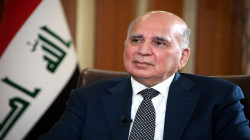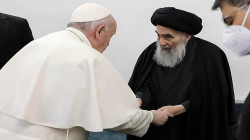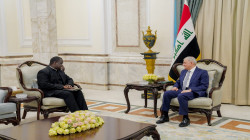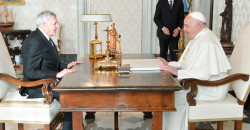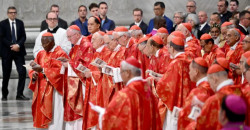Iraq's Cardinal Sako among potential Popes: Who will succeed Francis?
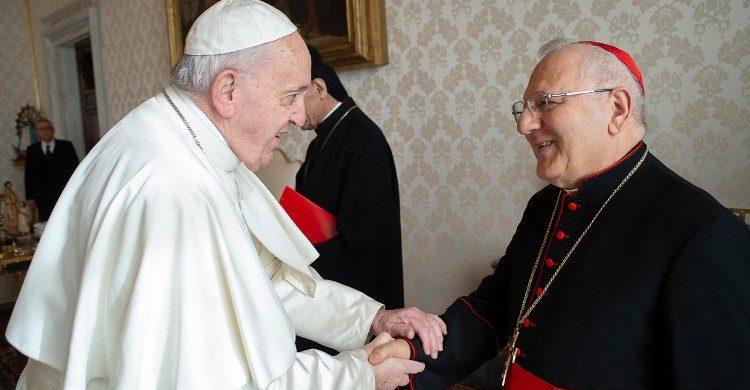
Shafaq News/ The death of Pope Francis, announced by the Vatican on Monday, has set the Roman Catholic Church on course toward one of its most defining rites: the election of a new pontiff. As Catholics around the globe enter a period of mourning, attention now turns to the College of Cardinals, who will soon gather in Rome to choose his successor.
According to the Vatican, the Church currently counts 252 cardinals worldwide. Of these, 135 are under the age of 80 and therefore eligible to vote in the conclave. Pope Francis appointed 108 of these electors during his pontificate, while 22 received their red hats under Pope Benedict XVI and five under Pope John Paul II.
Cardinals are expected to begin arriving at the Vatican in the coming days. Once assembled, they will meet to determine the date for the start of the conclave—a highly secretive process rooted in centuries of tradition. Taking place within the Sistine Chapel, the conclave bars all outsiders and continues until one cardinal secures a two-thirds majority. The world will learn of the election through the appearance of white smoke from the chapel’s chimney.
While the Church never releases an official list of candidates, speculation has already turned toward several prominent figures. Known as papabile (potential popes), these individuals are seen as possessing the theological depth, leadership experience, and international standing required of a future pope.
One name drawing growing attention is Cardinal Louis Raphaël I Sako, Patriarch of the Chaldean Catholic Church in Iraq. Middle East expert Saad Salloum notes that Sako's name has entered discussions, underscoring his global stature and the rising visibility of Eastern Catholic leaders within the broader Church hierarchy.
Who Is Cardinal Sako?
Cardinal Louis Raphaël Sako, Patriarch of Babylon of the Chaldeans, serves as a senior figure in Eastern Christianity and a leading voice for Iraq’s Christian community. Born on July 4, 1948, in the northern Iraqi town of Zakho, Sako has guided his community through decades of political instability and conflict.
He began his religious education in Mosul before completing advanced studies abroad. Sako holds a doctorate in Eastern Patrology from the Pontifical Oriental Institute in Rome and a doctorate in History from the Sorbonne in Paris. His academic background complements a long pastoral career, which included his service as Archbishop of Kirkuk before Chaldean bishops elected him patriarch in 2013—a decision confirmed by Pope Benedict XVI.
His tenure has coincided with some of the most challenging periods for Christians in Iraq, including the 2003 US-led invasion, the rise of ISIS, and mass displacement from historic Christian heartlands. Sako has remained a vocal defender of religious minorities, consistently speaking out against sectarianism and government actions that threaten the rights of Christians and other vulnerable groups.
In 2021, he played a key role in facilitating Pope Francis’ historic visit to Iraq, a landmark moment for interfaith dialogue and a message of solidarity with the country’s Christian population.
In 2023, Sako relocated from Baghdad to Erbil in the Kurdistan Region following the revocation of a presidential decree that had recognized his role as patriarch—an act he publicly challenged, emphasizing the need to protect the Church’s autonomy.
A proponent of reform, Sako has advocated for the use of vernacular Arabic in Chaldean liturgy to make worship more accessible, while remaining committed to traditional Church teachings. In 2024, he reaffirmed the Chaldean Church’s opposition to blessings of same-sex unions. That same year, he presided over the ordination of a married priest in France, in keeping with the Eastern Catholic tradition of allowing married clergy.
Fluent in Arabic, Chaldean, French, English, German, and Italian, Sako has contributed to numerous theological publications and serves on several Vatican bodies, including the Dicasteries for the Eastern Churches, Interreligious Dialogue, Culture and Education, and the Council for the Economy. Pope Francis elevated him to cardinal in 2018.
Papal Contenders
A well-known adage within Vatican circles cautions, "He who enters a conclave as pope, leaves as a cardinal." This saying underscores the unpredictable and confidential nature of the papal election process, which is not influenced by popularity or campaigning but is instead a solemn and complex deliberation.
Currently, the College of Cardinals is considering 22 individuals as serious contenders for the papacy. Among the most frequently mentioned is Cardinal Luis Antonio Tagle of the Philippines. Often referred to as the "Asian Francis," Tagle is known for his pastoral approach and has openly criticized the Church's historical treatment of marginalized communities, including LGBTQ+ individuals.
Cardinal Pietro Parolin, the Vatican’s secretary of state, is seen as a steady, diplomatic choice. Meanwhile, Cardinal Peter Erdö of Hungary represents the conservative wing, often opposing issues like marriage equality.
Other contenders include Cardinal Fridolin Ambongo Besungu, who has disagreed with Pope Francis on issues like same-sex blessings, and Cardinal Peter Turkson, a Ghanaian known for addressing taboo topics.
Cardinal Raymond Burke, a vocal critic of Pope Francis’ more progressive stances, also remains a strong possibility.
Meanwhile, Cardinal Jean-Marc Aveline, Archbishop of Marseille, has gained attention for his alignment with Pope Francis on matters such as immigration and interfaith cooperation, particularly with the Muslim world.
